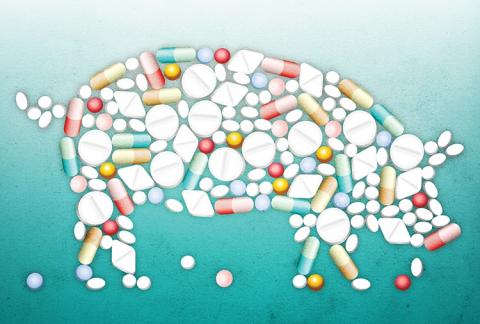
How the Powerful Meat Industry Denies the Science on Antibiotics Used in Livestock
Say a powerful, multibillion dollar industry has bet the farm on routinely using important human antibiotics where they’re not needed. Now, make a guess about that industry’s playbook once the world’s most respected health agency pronounces that this practice is endangering lives?
Denial?
Distraction?
Attack the messenger?
If you guessed any of the above, you’d be spot on.
It’s only been a week since the World Health Organization (WHO), which has been leading the global charge in the antibiotic resistance crisis, made an important announcement. I blogged then about the public health importance of WHO’s strong recommendations, which lay out exactly how food animal producers should be using – or more accurately, shouldn’t be using– antibiotics that are medically important.
In a nutshell, WHO called on countries to take action so that poultry and livestock producers worldwide would only use these precious medicines when their animals are actually sick, or have been exposed to other sick animals. Currently, many of them instead routinely feed medically important antibiotics, like tetracycline and erythromycin, to flocks and herds to promote more rapid growth, and to ‘prevent’ disease that hasn’t even occurred, and might not ever occur.
WHO was responding to a truism that no credible expert disputes: namely, that the use and overuse of antibiotics is a key driver of the resistance epidemic. We should be looking hard anyplace that antibiotics are overused, in other words, and try and stop them. In the U.S., as in much of the rest of the world, most antibiotics that are medically important are being sold for use in livestock production, not for treating sick people.
Let’s now talk about that industry playbook of denial, distraction and attack the messenger – virtually the same playbook Big Tobacco used for decades to head off regulation. The trigger seems to have been an official statement from the USDA’s Acting Chief Scientist, Dr. Chavonda Jacobs-Young (who does have a PhD, albeit in Wood and Paper Science, which is a bit different than medical scientists at the WHO).
Denial. Dr. Jacobs-Young said the WHO’s guidelines are not based on ‘sound science’. We’ve heard that one before. As has been well-documented using industry sources from the tobacco litigation archives, Phillip Morris created The Advancement of Sound Science Coalition in 1993 to deflect regulation by the EPA based on public health science that tied cancer to exposure to second-hand smoke. This time, USDA’s ‘sound science’ critique was quickly echoed by Texas Farm Bureau, Beef Magazine, and the North American Meat Institute, to name a few.
The reality is that the WHO recommendations rest on decades worth of good science, amounting to hundreds of published, peer-reviewed studies. The WHO commissioned a systematic review of that body of evidence, which also was published last week in the journal Lancet Planetary Health. On its website, WHO lists three additional ‘narrative’ reviews of the robust science, as well. In contrast, the poultry and livestock industries began putting medically important antibiotics into animal feed decades ago, but without ever having studied how that routine usage might affect antibiotic resistance or public health, which Maryn McKenna writes about in her superb new book, Big Chicken.
Distraction. A common distraction strategy is to mischaracterize an actual science-based recommendation and then to take potshots at the bastardized version, instead. In this case, the North American Meat Institute criticized the WHO for “advocating a blanket ban on using antibiotics to prevent disease”. The WHO did nothing of the kind.
WHO’s recommendation applies only to the subset of antibiotics that are important to human medicine. The industry can continue to use non-medically important drugs for a variety of purposes, including growth promotion and supposed ‘disease prevention’. But even for medically important drugs, the WHO recommendation is no ‘blanket ban’; the guidelines specifically indicate that “when a veterinary professional judges that there is a high risk of spread of a particular infectious disease, use of antimicrobials for disease prevention is justified, if such a judgement is made on the basis of recent culture and sensitivity testing results.” No blanket ban. Just common sense.
National Hog Farmer used the statement from USDA’s Chief Scientist to further mischaracterize the WHO recommendations as being based on ‘low quality’ science. For anyone who has read the systematic review article just published in the Lancet, this claim is a head-scratcher. Clearly, the WHO took its actions based on extensive science. The ‘low quality’ allusion derives from the very specific GRADE methodology that the WHO requires to be followed in formulating guidelines such as these.
Basically, the GRADE methodology means that even when there is very strong evidence that some action – like withdrawing routine antibiotic use, in this case – will benefit public health, the WHO can never characterize its final recommendation as having been based on anything stronger than ‘low level’ evidence so long as no randomized control trials, or RCTs, have been done.
RCTs are very expensive and time consuming to do; they also can be rather impossible to imagine, in certain situations. For instance, there’s never been an RCT done to test whether it is safer to do surgery with sterilized as compared to unsterilized scalpels. Neither has an RCT ever been done to test the hypothesis that wearing a parachute will prevent death when jumping out of an airplane. Applying the GRADE criteria, a hypothetical WHO recommendation would not be able to recommend either clean scalpels or the wearing of parachutes while claiming more than a ‘low level’ of scientific support.
The WHO intentionally puts in place a very high scientific hurdle to adopt any kind of public health recommendation. The fact there is a WHO recommendation at all in this case is a testament more to the strength of the evidence in surmounting that high hurdle, than a comment on the weakness of that evidence.
Attack the messenger. The editor of the Beef magazine went so far as to attack the WHO as being ‘unethical’ and guilty of data manipulation; we’ve never met, but he also faulted me for being ‘anti-agriculture’.
Neither is true, of course. I’ve worked on this issue for 17 years, fourteen of them as a staff member at an organization that advocates on behalf of small farmers and sustainable agriculture. The food animal industries themselves have been at the forefront of ending routine use of medically important antibiotics in healthy animals in both Denmark and the Netherlands. Those industries continue to grow and prosper. And, the two countries have reduced their overall use of antibiotics in animal agriculture by around 50% and 64%, respectfully through 2016.
In the end, good science will win out. The waning effectiveness of antibiotics will become so obvious that denying the urgent need to get smarter about their use will no longer be a winning strategy, politically or in the marketplace.
The WHO recommendations offer an alternative path for countries that are still feeding our most precious antibiotics to healthy animals. I hope that in the U.S. we take it.



The views and opinions expressed in this post are those of the author(s) and do not necessarily reflect those of MomsRising.org.
MomsRising.org strongly encourages our readers to post comments in response to blog posts. We value diversity of opinions and perspectives. Our goals for this space are to be educational, thought-provoking, and respectful. So we actively moderate comments and we reserve the right to edit or remove comments that undermine these goals. Thanks!